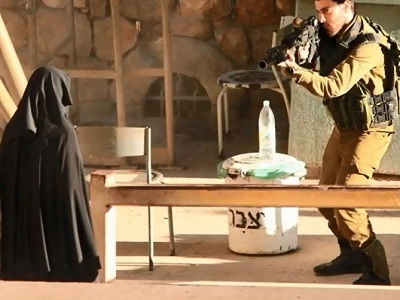
By Mahmoud Zidan
The opinion pages of most newspapers are dominated by male writers. Since I started reading newspapers in general and English-speaking newspapers in particular – that was when I was at high school and struggling with English – I couldn’t help but notice the scarcity of female voices and the preponderance of male ones.
This is to assert that I’m fully conscious of my problematic position in this article. I can’t speak for women at all. But that doesn’t mean that I can’t show my solidarity with women, especially in the form of paying tribute to their efforts. In this article, I’m paying tribute to Hadeel Salah al-Hashlamon.Unveiling Hadeel and Beyond
Hadeel, a 19-year-old university student, was a Hebron resident—a city that bursts with Israeli settlements. On the 22nd of September, she was shot dead by Israeli soldiers at a checkpoint. The Israeli narrative accuses Hadeel of attempting to stab a soldier.
But the Israeli army is used to distorting facts. Soon after her murder – described by Amnesty International as “extrajudicial execution” – the news agency PalMedia posted a video that belied the Israeli narrative. Hadeel didn’t threaten nor stab the soldier and her wounds weren’t in the extremities, as the Israeli army spokeswoman claimed. She was shot in the chest point blank.
For anybody reading about this incident without looking at Hadeel’s picture, the Israeli army’s act looks like a folly, and it might as well be. However, when one knows that Hadeel was wearing a burqa, some might “rationalize” the act.
The burqa immediately made her suspect, and it unfortunately placed her in a discourse that automatically consigns the label “terrorist” to her; a discourse that is strongly embraced in many European countries, hence the ban on the burqa in some places. Placing Hadeel’s story in that discourse made her story lose its specificity and rendered its construal only possible in the context of the universal war against terrorism.
The counter-narrative tells a much more believable and nuanced story. At the checkpoint, Hadeel refused to succumb to the Israeli soldier’s order to remove her burqa. She considered that an encroachment on her privacy (whether one is opposed to the burqa or not is really beside the point). If Hadeel had been requested to unveil by a female soldier and in a private space, she would have immediately acquiesced to removing the burqa and the veil.
What makes me so sure about it? Many Palestinian women are stopped at airports and other ports of entry controlled by Israel. They are subjected to different forms of humiliation and harassment. More often than not, they are even ordered to strip. When they reject that humiliation in the presence of male soldiers, the automatic reaction by the Israeli soldiers is criminalize them and subjugate them to further interrogations and warnings.
Why does the Israeli government endorse such policies? Because they know quite well that women, when they resist, contribute greatly to the liberation of the colonized; the Algerian woman is an example, as Frantz Fanon and historians of the Algerian Revolution show. That’s why Israel is targeting Palestinian women, especially the Muslim ones. In the aftermath of the War on Gaza, the United Nations Commission on the Status of Women described what Palestinian women go through as a “grave situation.” They declared that Palestinian women are deprived of “advancement, self-reliance and integration in the development of their society.”
Palestinian women are deprived of all those rights despite the fact that Israel signed the UN Convention of the Elimination of all Forms of Discrimination against Women (CEDAW). Let’s remember that Israel is a misogynistic society in essence, and Palestinian women aren’t the only victims. Although the spokesperson for the Israeli army is a woman, the Israeli army is notorious for its misogyny. In addition, Israeli society itself is notorious for the fact that rape is rampant, as journalist David Sheen has shown.
Hadeel’s symbolic rejection of that colonial misogynistic culture–that is, her refusal to unveil her burqa—ironically unveils a system that is inherently based on oppressing a people and its women. More importantly, her act proves that Palestinian women’s “no” resounds strongly, and their resistance–including that of the Murabitat, a video of the brutal arrest of one of whom was circulated by Palestinian activists a couple of days ago–is alive and well.
– Mahmoud Zidan is a professor of English literature at the University of Jordan. He contributed this article to PalestineChronicle.com.




